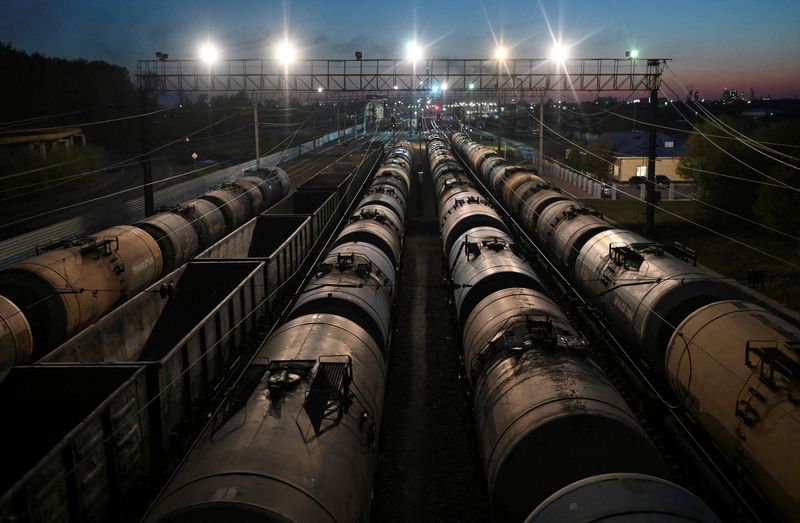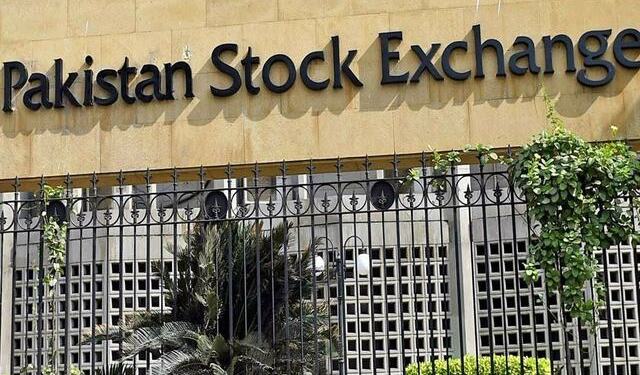
© Reuters. FILE PHOTO: A view shows railroad freight cars, including oil tanks, in Omsk, Russia May 1, 2020. REUTERS/Alexey Malgavko
(Reuters) – Australia, Britain, Canada and the United States have imposed outright bans on Russian oil purchases following Moscow’s invasion of Ukraine, but members of the European Union are split.
EU foreign ministers failed to agree on Monday on sanctioning Russian gas and oil supplies, which account for 40% and 27% of the bloc’s total use of those commodities respectively.
Germany, the EU’s top user of Russian crude oil and the Netherlands, a key trading hub, argue that the EU can not cut its dependence on Russian supplies overnight.
Hungary opposed a ban on Russian energy imports, while Bulgaria said it may seek an exemption if such a ban is approved.
Some landlocked refineries in Eastern Europe and Germany are almost completely dependent on Russian crude supplies via pipelines.
Other buyers in Europe and elsewhere, however, shunned Russian crude voluntarily to avoid reputational damage or possible legal difficulty, with traders warning about potential supply shortages.
The chief executives of three of the biggest energy traders — Vitol, Gunvor and Trafigura — said their companies have halted spot purchases of Russian oil, but were seeing out existing longer-term contracts.
Trafigura pegged lost Russian crude and products so far at between 2 million and 2.5 million barrels per day (bpd), while Vitol and Gunvor said the decline was difficult to calculate, but they did not expect the shortfall to exceed more than 3 million bpd.
Last week preliminary data suggested that imports of Russian crude were down by around 0.5 million bpd, which could widen to 1.5 million to 2 million bpd this and next week, estimates by FGE consultancy showed.
Rystad Energy said on Monday that crude cargo departures from Russia’s main western ports were down by at least 1.5 million bpd since the invasion, and since March 12 there have been no departures reported.
Outside the EU, China and India, which have refused to criticise Russia’s invasion of Ukraine, continued to buy Russia oil, as well as Turkey, which is seeking to mediate between Kyiv and Moscow.
The following lists major takers of Russian crude:
NEFTOCHIM BURGAS
Bulgarian refinery, owned by Russia’s Lukoil, and with Russian crude accounting to about 60% of its total intake, continues to refine Russian crude.
MIRO
Russian crude continues to account for about 14% of the intake at Germany’s largest refinery, Miro, which is 24% owned by Rosneft..
PCK SCHWEDT
Germany’s refinery, 54% owned by Rosneft, receives crude oil via the Druzhba pipeline.
LEUNA
The land-locked Leuna refinery in eastern Germany, majority-owned by TotalEnergies, is also fed Russian crude by the Druzhba pipeline.
HELLENIC PETROLEUM
Greece’s biggest oil refiner is relying on Russian crude for about 15% of its intake. The company earlier this month secured additional supplies from Saudi Arabia.
ISAB
Italy’s largest refinery, owned by Lukoil-controlled Swiss-based Litasco SA, processes Russian and non-Russian crudes.
MOL
The Hungarian oil group, which operates three refineries in Hungary, Slovakia and Croatia, continues to be supplied by the Druzhba pipeline. Hungary is opposed to sanctions on Russian oil and gas.
PKN Orlen
Poland’s largest refiner, which continues to buy Russian crude for its refineries in Lithuania, Poland and the Czech Republic, said it was preparing for a complete halt.
PKN has bought at least three cargoes of Norway’s Johan Sverdrup crude in March to supply its refinery in Lithuania, replacing Russian Urals, shipping data showed.
ZEELAND REFINERY
The Dutch refinery, 45% owned by Lukoil, declined to comment on whether it was using Russian crude oil.
ROTTERDAM REFINERY
Exxon Mobil (NYSE:XOM) declined to comment on whether its Dutch refinery in Rotterdam was using Russian crude oil.
HINDUSTAN PETROLEUM,
India’s state refiner bought 2 million barrels of Russian Urals for May loading, according to trading sources last week.
INDIAN OIL
India’s top refiner has bought 3 million barrels of Urals for May delivery, trade sources said.
The following lists those that have stopped buying Russian oil:
BP (NYSE:BP)
The British oil major, which is abandoning its stake in Rosneft, will not enter new deals with Russian entities for loading at Russian ports, unless “essential for ensuring security of supplies”.
ENEOS
Japan’s biggest refiner has stopped buying crude oil from Russia, while some cargoes signed under previous agreements will arrive in Japan until around April.
ENI (MI:ENI)
The energy group, 30.3% owned by the Italian government, is suspending purchases of Russian oil.
No Russian crude will be used at Germany’s Bayernoil refinery, in which Eni and Rosneft have stakes.
EQUINOR
Norway’s majority state-owned energy firm has stopped trading Russian oil as it winds down its operations in the country.
GALP
The Portuguese oil and gas company has suspended all new purchases of petroleum products from Russia or Russian companies.
NESTE
The Finnish refiner has Russian oil contracts until the end of the year, but is not making any new supply agreements.
PREEM
Sweden’s largest refiner, owned by Saudi billionaire Mohammed Hussein al-Amoudi, has “paused” new orders of Russian crude, which accounted for around 7% of its purchases, replacing them with North Sea barrels.
REPSOL
The Spanish company has stopped buying Russian crude oil in the spot market.
SHELL
The world’s largest petroleum trader will stop buying Russian crude and phase out its involvement in all Russian hydrocarbons.
TOTALENERGIES
The French oil major, will not sign new contracts, promising to stop buying Russian crude oil and petroleum products by the end of this year.
VARO ENERGY
The Swiss refiner, which owns 51.4% in Germany’s Bayernoil refinery, said it did not plan to enter into new deals to buy Russian crude.
Source: Investing.com

























